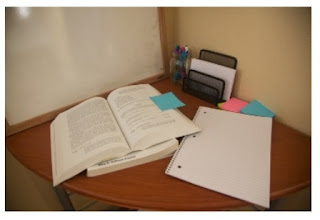Midterm Writing Exams Guide: 11 Tips and Tools to Show Your Best Self
If you’ve got exams ahead, then you need to make sure that you are fully prepared. Follow our top 11 tips to make sure that you start off from the right possible position!
1.Space
You need to make sure that the space that you will study in works for you.
Ask yourself: Do you have enough room to spread out all of your notes and textbooks? Do you have a comfortable chair? Is there sufficient light in the room?
Are all distractions out of the way? Distractions are something that you need to avoid and be sure that you are comfy and can focus.
Some of us like to revise in silence whilst others like to have some music on in the background. Some of us like to work in a cluttered environment and some prefer to be organized and tidy.
You need to consider what works best for you and make sure that you spend time getting this right.
When revising, visual aids can be very useful. When you start revising a topic, begin by writing down everything that you know and use a highlighter to highlight any gaps in your knowledge.
When you get closer to an exam you will need to condense this information so that you have a one-page diagram. By doing this you will be able to quickly recall everything that you need to know for an exam.
3.Apps
There are plenty of apps available to download which can aid your revision. Custom writing services are also at your disposal to help you out.
4.Time
When it comes to revision, make sure that you leave enough time to revise and that you haven’t left it until the last minute. Although some students like to cram at the last minute, you’re probably aware that this is not the ideal approach to take when it comes to exam preparation.
To organize your time efficiently, create a timetable for your revision. Begin by noting down the number of exams that you have and the days/dates that you have to sit them. The next step is to organize your revision accordingly. It may be that some exams need more revision time than others, so you need to create a balance that works well for you.
7.Explain
Use the people around you at exam time. Explain answers to them as this will help you to get answers clear in your mind and should also help to highlight aspects that you may need to do more work on.
8.Brain Food
You may crave treats, and you don’t have time to cook. Remember what you eat can affect your focus and energy levels so try and stay clear of junk foods. Choose nutritious food which will fuel your brain and body; opt for blueberries, yoghurt, seeds, nuts, and fish to help memory and concentration.
On the day of exams, make sure that you eat a meal consisting of foods that give the body a slow release of energy. Although sugar may be tempting, you will find that it causes energy levels to plummet.
9.Breaks
You may feel like you need to revise for hours on end but this is actually ineffective. Consider if you were getting prepared for a marathon, you wouldn’t run all day and night. So when to comes to revising for exams, it’s a known fact that in order to retain information, regular breaks are useful.
We all work best at different times of the day. If you study better first thing, then start early and remember to take a break before lunch. If, on the other hand, you study better at night, then take a longer break earlier in the day so that once it’s evening time, you can focus and settle down. Don’t ever feel guilty for getting out and enjoying the sun as vitamin D plays an important role in the health of your brain.
10.Water
In order for your brain to work at its best, it needs to be hydrated. Drink lots of water whilst you revise and also drink water on the day of your examinations.
When you know how long it will take you to get to the place where your exams are held, allow some extra time. You don’t want to end up in a situation where you have to run half of the distance or get confused about the directions. If you prefer you could make arrangements to travel with classmates or friends as long as they are punctual and won’t end up making you late.
About author: Todd Hale is a dropout student of the Humanities faculty. With no degree in his pocket, but with some wit and irony in his head, he shares valuable tips that are aimed at making students’ life far more enjoyable and amazing. His MidTerm blog is the well of know-hows and life hacks.
Todd Hale is a dropout student of the Humanities faculty. With no degree in his pocket, but with some wit and irony in his head, he shares valuable tips that are aimed at making students’ life far more enjoyable and amazing. His MidTerm blog is the well of know-hows and life hacks
1.Space
You need to make sure that the space that you will study in works for you.
Ask yourself: Do you have enough room to spread out all of your notes and textbooks? Do you have a comfortable chair? Is there sufficient light in the room?
Are all distractions out of the way? Distractions are something that you need to avoid and be sure that you are comfy and can focus.
Some of us like to revise in silence whilst others like to have some music on in the background. Some of us like to work in a cluttered environment and some prefer to be organized and tidy.
You need to consider what works best for you and make sure that you spend time getting this right.
2.Diagrams and Flow Charts
When revising, visual aids can be very useful. When you start revising a topic, begin by writing down everything that you know and use a highlighter to highlight any gaps in your knowledge.
When you get closer to an exam you will need to condense this information so that you have a one-page diagram. By doing this you will be able to quickly recall everything that you need to know for an exam.
3.Apps
There are plenty of apps available to download which can aid your revision. Custom writing services are also at your disposal to help you out.
4.Time
When it comes to revision, make sure that you leave enough time to revise and that you haven’t left it until the last minute. Although some students like to cram at the last minute, you’re probably aware that this is not the ideal approach to take when it comes to exam preparation.
To organize your time efficiently, create a timetable for your revision. Begin by noting down the number of exams that you have and the days/dates that you have to sit them. The next step is to organize your revision accordingly. It may be that some exams need more revision time than others, so you need to create a balance that works well for you.
5.Past Exam Papers
A great way of preparing for an exam is to practice old papers. This way you will be prepared for the format of the questions, and you can also time yourself so that you know that you are taking the correct amount of time per section.6.Study Groups
Organize study sessions with friends. This way, you can answer each other’s questions. It may even be worth setting a specific time to study, and this way, you can ensure that you all remain focused and on task.7.Explain
Use the people around you at exam time. Explain answers to them as this will help you to get answers clear in your mind and should also help to highlight aspects that you may need to do more work on.
8.Brain Food
You may crave treats, and you don’t have time to cook. Remember what you eat can affect your focus and energy levels so try and stay clear of junk foods. Choose nutritious food which will fuel your brain and body; opt for blueberries, yoghurt, seeds, nuts, and fish to help memory and concentration.
On the day of exams, make sure that you eat a meal consisting of foods that give the body a slow release of energy. Although sugar may be tempting, you will find that it causes energy levels to plummet.
9.Breaks
You may feel like you need to revise for hours on end but this is actually ineffective. Consider if you were getting prepared for a marathon, you wouldn’t run all day and night. So when to comes to revising for exams, it’s a known fact that in order to retain information, regular breaks are useful.
We all work best at different times of the day. If you study better first thing, then start early and remember to take a break before lunch. If, on the other hand, you study better at night, then take a longer break earlier in the day so that once it’s evening time, you can focus and settle down. Don’t ever feel guilty for getting out and enjoying the sun as vitamin D plays an important role in the health of your brain.
10.Water
In order for your brain to work at its best, it needs to be hydrated. Drink lots of water whilst you revise and also drink water on the day of your examinations.
11.Exam Day
Don’t leave being prepared for the day of your exams. Make sure that you know what you need to take with you and that know the route you will take to get to the exam and how long it will take to get there. If possible, do a test run of your route and if you haven’t had a chance to do this, then write down some clear directions.When you know how long it will take you to get to the place where your exams are held, allow some extra time. You don’t want to end up in a situation where you have to run half of the distance or get confused about the directions. If you prefer you could make arrangements to travel with classmates or friends as long as they are punctual and won’t end up making you late.
About author: Todd Hale is a dropout student of the Humanities faculty. With no degree in his pocket, but with some wit and irony in his head, he shares valuable tips that are aimed at making students’ life far more enjoyable and amazing. His MidTerm blog is the well of know-hows and life hacks.
Todd Hale is a dropout student of the Humanities faculty. With no degree in his pocket, but with some wit and irony in his head, he shares valuable tips that are aimed at making students’ life far more enjoyable and amazing. His MidTerm blog is the well of know-hows and life hacks








No comments:
Post a Comment